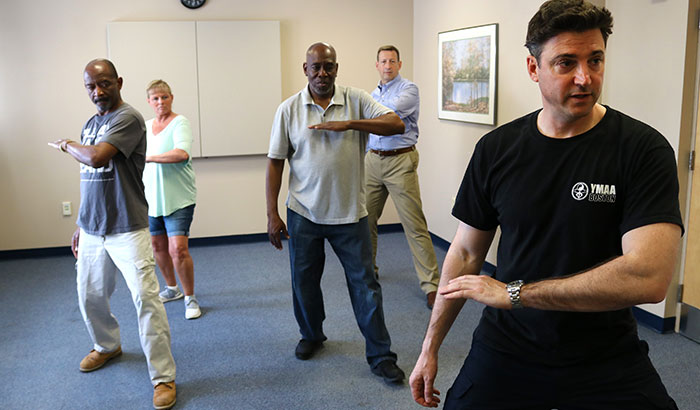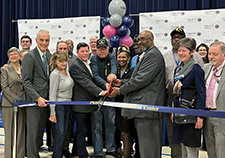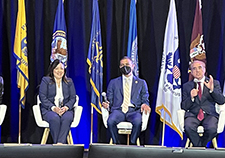Office of Research & Development |
 |


Tai chi instructor Brian Muccio demonstrates a movement with the help of a few VA employees who are also Veterans. The participants shown are not part of the ongoing Gulf War illness study. (Photo by Mackenzie Adams)
May 23, 2018
By Mike Richman
VA Research Communications
VA researchers are studying whether an ancient Chinese mind-body therapy can help relieve the chronic pain, fatigue, and other symptoms experienced by thousands of Gulf War Veterans.
The VA Boston Healthcare System is hosting a randomized trial to test the effectiveness of tai chi in the context of Gulf War illness (GWI).
Practiced for centuries, tai chi was first developed as a form of self-defense. It has since evolved into a graceful form of exercise that is known to improve balance and coordination skills, with a series of slow and deliberate balletic body movements. The movements combine flowing postures with breathing, meditation, and stretching. Sometimes, peaceful instrumental music is played in the background as one performs the exercise.
Tai chi is often referred to as “meditation in motion.”
Dr. Barbara Niles, a research psychologist at the National Center for PTSD at VA Boston, is leading the trial. She’s also an assistant professor of psychiatry at Boston University. Her research focuses on promoting health-enhancing behaviors, such as exercise and mindfulness meditation, in traumatized people.
One of her long-time colleagues at VA Boston, Dr. Deanna Mori, is the co-principal investigator on the study.
Use of tai chi as a therapy at VA facilities has been on the rise, part of VA’s larger whole health approach. That concept is based on helping Veterans take charge of their health and well-being, in part, by encouraging them to participate in tai chi, yoga, and other mind-body therapies. However, evidence to support Veteran use of those programs is lacking, Niles says.
“There are no published randomized trials of tai chi for Gulf War illness, which is why we are doing our study,” she says. “But there are also no randomized trials of tai chi for PTSD, a much more common Veteran ailment. We’re interested in research in this area to provide a better evidence base that can inform VA providers and policymakers on decisions about the treatments that should be given to Veterans.”
"There are no published randomized trials of tai chi for Gulf War illness, which is why we are doing our study."
Previously, Niles led a feasibility study that introduced tai chi to the VA Boston facility. The study included 17 Veterans who had reported major symptoms of PTSD. More than 90 percent said they were satisfied with the program.
The participants indicated that the tai chi sessions helped in managing their symptoms, such as intrusive thoughts and concentration difficulties, and in improving attention, alertness, and information processing. Every Vet who took part said he or she would like to participate in future tai chi programs and would recommend the exercise to a friend.
“I like the fluid movement of tai chi, it takes me out of my depression and my anxiety,” one Veteran said in an exit interview. “I feel great when I’m doing it, I feel better when I’m finished. [Tai chi] is helping me breathe better and concentrate better. I don’t get as distracted with my symptoms.”
Another participant remarked: “I’m not as jumpy as I used to be. My dreams have subsided, too. I think [tai chi] has given me hope. All Veterans, suffering from PTSD or not, could use [it].”

AI to Maximize Treatment for Veterans with Head and Neck Cancer

VA opens new research center to seek novel arthritis treatments

Under Secretary of Health, panel of experts discusses PACT Act impacts for Veterans

Self-harm is underrecognized in Gulf War Veterans
Now, Niles and her team are hoping tai chi will help relieve some of the debilitating symptoms of Veterans with Gulf War illness. The exercise has been shown to benefit patients experiencing other forms of chronic pain, such as fibromyalgia. That disorder produces symptoms similar to those of GWI: widespread musculoskeletal discomfort accompanied by fatigue, mood, memory, and sleep issues.
An estimated 300,000 Veterans have GWI, a complicated condition that affects various organs, most notably the brain. Common symptoms include fatigue, rashes, serious body aches and joint swelling, gastrointestinal problems, memory loss, depression, anxiety, chronic headaches, mood and sleep problems, and attention difficulties.
Research has shown that few therapies substantially improve pain and fatigue for GWI symptoms without major undesirable side effects, including worsening cognitive symptoms. Most treatments for GWI have been pharmaceutical.
For the ongoing trial, Niles and her colleagues are recruiting 120 Gulf War Vets who are being randomized into two groups: tai chi and wellness education. The latter is a skills-based class that focuses on exercise, surroundings, diet, sleep habits, relationships, spirituality, and relaxation. It corresponds with the VA Whole Health System, which supports physical, mental, emotional, spiritual, and environmental elements that work together to provide the best quality of life for Veterans.
Niles explains that the wellness class is more than a “simple control group.” It’s an “excellent group that will have a substantial impact on improving quality of life for the Veterans who participate in it,” she says.
“Tai chi encourages meditation, relaxation, and gentle movement simultaneously, and it impacts mental states, muscles, circulation, and breathing all at the same time,” she says. “Wellness also focuses on mind and body, although the approach is different. Education about wellness is a major component of the wellness group, along with mindfulness training and mutual support from other group members. It’s a little more like a class or workshop.”
Both groups are taking part in two 60-minute sessions per week for 12 weeks.
The tai chi participants are practicing under the instruction of a certified Yang-style tai chi instructor. Every session includes a warm-up and a review of tai chi principles, plus meditation with tai chi movement, breathing, and relaxation techniques. The instructors are advising the patients to practice at home at least 30 minutes a day during the 12-week period and are providing training materials.
Each wellness session includes a video clip and a brief mindfulness exercise that corresponds with the material being presented. The study’s project coordinator, Dr. Katharine Smidt of VA Boston, leads the sessions, along with a psychology trainee. Participants are asked to set reasonable and attainable goals each week and to make changes in how they live their lives in hopes of improving their sense of well-being.
Outcome assessments for both groups are based on interviews and questionnaires at the end of the 12-week period, and at three and nine months post-study. The assessments will measure pain, fatigue, cognition, quality of life, and physical functioning.
Final results are expected in 2021.
Niles and her colleagues believe the tai chi group may outperform the wellness group in the end.
“Previous research on tai chi for other diseases, such as fibromyalgia and knee osteoarthritis, has shown it performs better than comparison groups like health education, physical therapy, or aerobic exercise,” Niles says. “We believe tai chi’s focus on the experiential integration of both mind and body is a key component of that treatment that may help our participants.”
At the same time, the researchers hypothesize that both treatments will help in reducing pain, fatigue, and cognitive symptoms, in physical functioning, and in quality of life.
“We believe both treatments are good, and we don’t know if one group will be superior to the other,” Niles says.
Prior to embarking on the tai chi feasibility study, Niles says she had researched mind-body therapies, such as mindfulness and yoga, but knew little about the Chinese exercise. She also hadn’t been in a tai chi class.
Now, she and her team are practicing tai chi as part of the randomized study, which calls for at least one researcher to be in every tai chi class. They’ve been “won over” by the exercise, she says.
“We’ve learned the movement sequences, along with the Veteran participants,” she says. “We also use the home practice materials and relaxation and stretching exercises frequently. We have fabulous instructors, and we love how relaxed, invigorated, and refreshed we feel after the tai chi groups.”
Niles is currently working on a grant application for a randomized trial of tai chi for Veterans with PTSD. Her team is also preparing to carry out a tai chi pilot study involving Vets ages 60 and older who have been exposed to some form of trauma.
“In recent years, we’ve learned a great deal about tai chi and how to study it,” she says. “We are planning to apply that knowledge to future trials.”
VA Research Currents archives || Sign up for VA Research updates